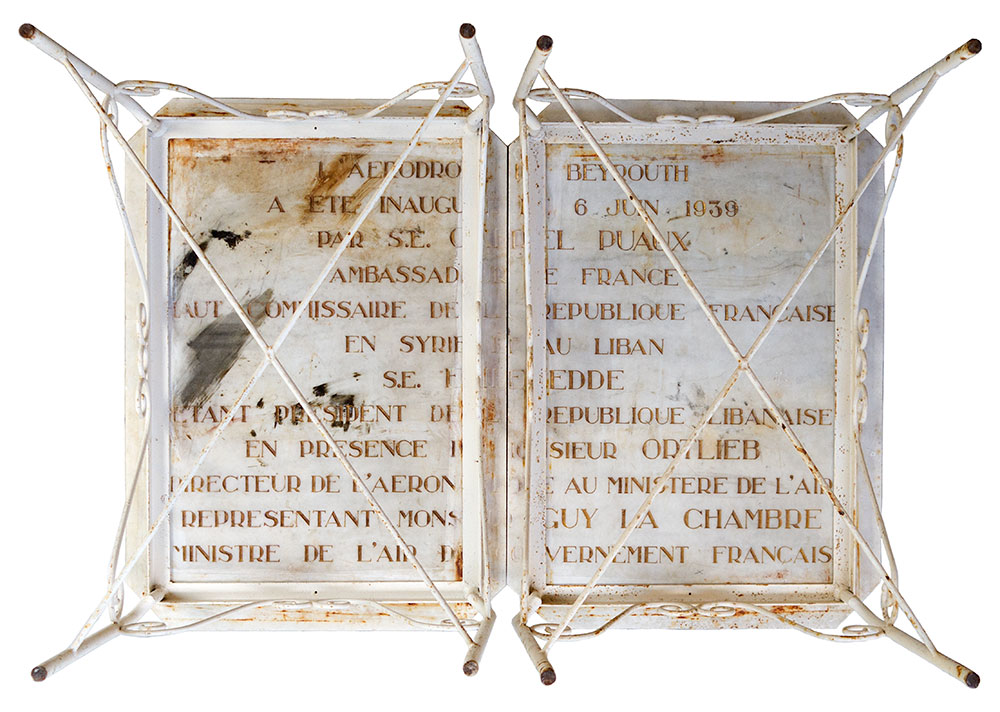|
|
|
|
|

|
Fragments from
the History of Civil Aviation in
Lebanon. Part IV, section 2b.
The inauguration of Beirut
Airport
Two marble plates, two iron
structures. Courtesy
of Nada Habis Assi
Commissioned for Cycles of
Collapsing Progress, Tripoli,
2018, curated by Karina el-Helou
with the collaboration of Anissa
Touati.
Fragments de l'histoire de
l'aviation civile au Liban.
Partie IV, section 2b.
Inauguration de l'aérodrome de
Beyrouth
Deux plaques
de marbre, deux structures en
fer. Courtesy de Nada Habis Assi
Commandée pour Cycles of
Collapsing Progress, Tripoli,
2018. Commissariat: Karina
el-Helou avec la collaboration
d'Anissa Touati.
|
On June
6, 1939, authorities of the French
Mandate in Lebanon and Syria
dedicated Beirut’s airport. Built
on sandy grounds in the southern
outskirts of the city, it was
equipped with a passenger
terminal, air sheds and a control
tower.
After World War II, as the
development of air transport
required larger structures, a
newer airport was to be built in
Khaldeh. In order to ensure its
funding, the government decided to
parcel out the grounds of the
first airport on the real estate
market. In consequence, after the
opening of the new Beirut
International Airport, on April
12, 1954, the previous one was
immediately demolished.
The commemorative plaque was
dismantled and put aside.
Ultimately, the plaque re-emerged,
cut in two parts and converted in
two table tops, being the only
physical remains of Beirut’s first
airport.
Le 6 juin 1939,
les autorités mandataires
françaises au Liban et en Syrie
ont inauguré l’aéroport de
Beyrouth. Construit sur des
terrains sablonneux au sud de la
ville, il était équipé de deux
pistes, une aérogare, un hangar
et une tour de contrôle.
Après la 2e guerre mondiale,
l’accroissement du trafic aérien
a nécessité de plus vastes
infrastructures et un nouvel
aéroport fut mis en chantier
plus au sud, à Khaldé. Afin
d’assurer son financement, le
gouvernement décida de
subdiviser en parcelles les
terrains du premier aérodrome et
de les placer sur le marché
immobilier. En conséquence, peu
après l’ouverture du nouvel
Aéroport international de
Beyrouth, le 12 avril 1954,
l’ancien aéroport fut
immédiatement démoli.
La plaque commémorative fut
détachée et mise de côté. Des
décennies plus tard, elle
réapparut, coupée en deux et
convertie en plateaux de tables,
dans le jardin d’une résidence
dans le village de montagne de
Dahr el Sawan. Il s’agit de
l’unique vestige physique du
premier aéroport de Beyrouth.
|
Publication
-
Cycles of Collapsing Progress. Works on Paper
Related
Projects
- Fragments
from the History of Civil
Aviation in Lebanon. Part
VI, section 1c
- Traversées
photographiques. Le
journal du Docteur Cottard
|
|
|
|
|